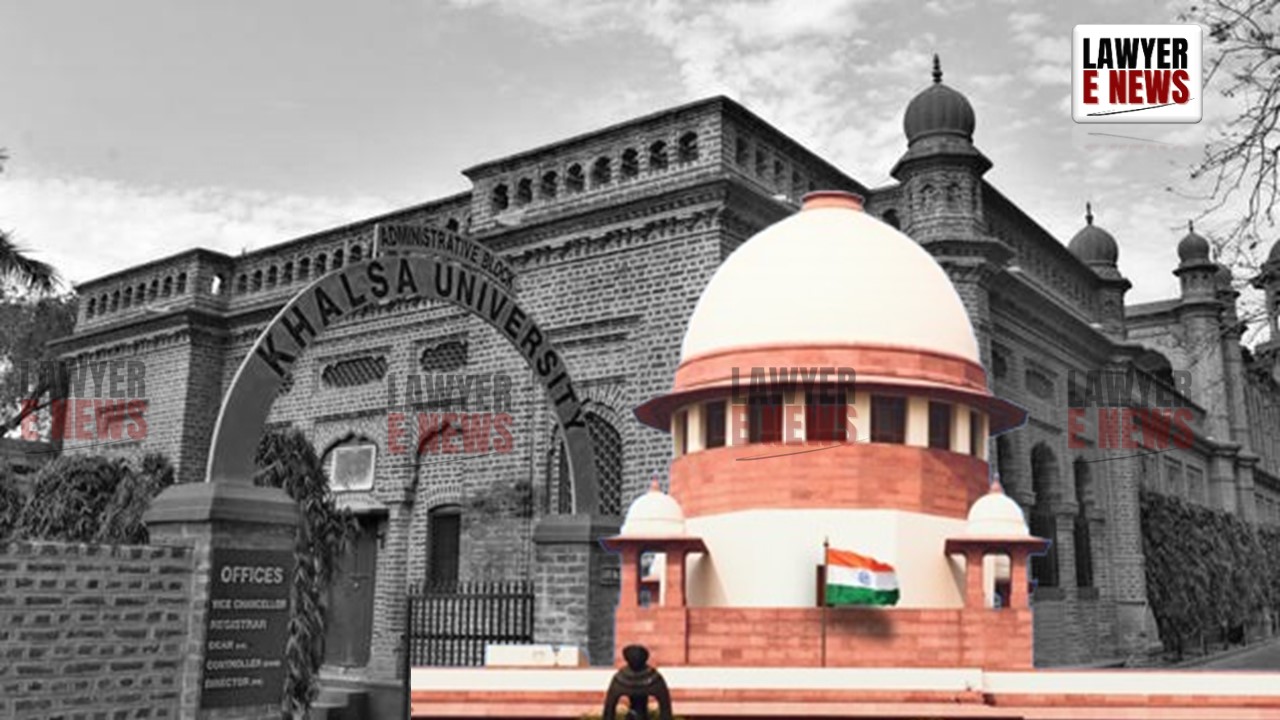-
by Admin
15 February 2026 5:35 AM



Today, On October 3, 2024, the Supreme Court of India delivered a landmark ruling in the case of Khalsa University & Anr. v. State of Punjab & Anr.. The Court struck down The Khalsa University (Repeal) Act, 2017 as unconstitutional, declaring it violative of Article 14 of the Indian Constitution. The ruling highlights the issue of manifest arbitrariness in legislation targeting specific institutions.
Khalsa University was established under The Khalsa University Act, 2016 following the Punjab Private Universities Policy, 2010, which aimed to expand higher education in the state. Shortly after its establishment, the university admitted students and was operational. However, in 2017, following a change in the Punjab state government, led by Captain Amarinder Singh, an ordinance was issued to repeal the university's establishment, citing concerns that the new university might overshadow the heritage of Khalsa College, Amritsar, a prestigious institution established in 1892. This ordinance was later formalized through The Khalsa University (Repeal) Act, 2017.
The appellants, Khalsa University and the Khalsa College Charitable Society, challenged the repeal, arguing that the act was discriminatory, arbitrary, and violated their fundamental rights under Article 14, which guarantees equality before the law. They asserted that no other private universities established under the 2010 policy had been targeted.
Is legislation giving differential treatment to a single entity valid?
Is the Khalsa University Repeal Act, 2017 arbitrary and violative of Article 14?
The Punjab Government defended the repeal by arguing that Khalsa College, due to its historical importance, needed protection, and the existence of Khalsa University on the same premises could diminish its reputation. They claimed that this constituted a reasonable classification under Article 14, which permits differential treatment if it has a rational connection to a legitimate objective.
The appellants, represented by Senior Advocate P.S. Patwalia, argued that the repeal act was based on a non-existent factual premise. They emphasized that the establishment of Khalsa University did not affect Khalsa College, and the university had no affiliation with the heritage institution, focusing on entirely different academic programs.
"The heritage of Khalsa College was not impacted by the establishment of Khalsa University." – Supreme Court
Justice B.R. Gavai, delivering the judgment, held that the basis for the Khalsa University (Repeal) Act, 2017 was arbitrary and unsupported by any substantial evidence. The Court emphasized that the claim that Khalsa University would harm the character and prestige of Khalsa College was unfounded. Maps and documents submitted during the proceedings showed that Khalsa College, a heritage institution, remained untouched, while Khalsa University only transformed three existing colleges into its departments. No architectural or operational overlap existed that would justify the repeal.
The Court observed that legislation targeting a single institution must have a reasonable and factual basis, which was absent in this case. The Court further noted that none of the other private universities established under the 2010 policy had been repealed, and singling out Khalsa University without substantial justification constituted a violation of Article 14.
"The classification made was without any substantial basis and hence discriminatory." – Supreme Court
The Court referenced several previous rulings, including Chiranjit Lal Chowdhuri v. Union of India and Shayara Bano v. Union of India, affirming that even single-entity legislation must meet the test of reasonableness under Article 14. It ruled that the Repeal Act was based on "manifest arbitrariness" and was therefore liable to be struck down. The Court also highlighted the principle that arbitrariness in legislative action is grounds for declaring a law unconstitutional.
Quashed the judgment of the Punjab and Haryana High Court, which had upheld the repeal.
Declared The Khalsa University (Repeal) Act, 2017 unconstitutional.
Ordered the reinstatement of the original Khalsa University Act, 2016, restoring the status quo as of May 29, 2017.
The Supreme Court's decision in this case has far-reaching implications for legislative actions targeting individual institutions. By striking down the Khalsa University Repeal Act, the Court reaffirmed that laws must not be arbitrary or discriminatory, and that special treatment of a single entity requires a solid factual and legal basis. This ruling strengthens the legal standards surrounding equality and non-arbitrariness in the legislative process.
Date of Decision: October 3, 2024
Khalsa University & Anr. v. State of Punjab & Anr.
